
Tie-in novels to film and television franchises often have a poor reputation. It’s one that’s not entirely unfair; they are often mass-produced, badly-written, poorly-edited affairs, with covers that barely go beyond taking a promotional photo of the show’s cast and slapping a logo on top. They are derided by readers of “serious” literature, and even by many fans of the franchise itself, and oftentimes with good reason.
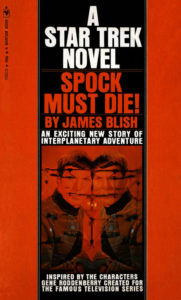 And then there’s Star Trek. There have been Star Trek novels ever since, essentially, there was a Star Trek. The first, titled simply Star Trek, was published in 1967 as a collection of seven short story adaptations of scripts from the show’s first season. This was followed very quickly by the first original Star Trek novel, a YA book by Mack Reynolds entitled Mission to Horatius. James Blish, while continuing to adapt episode scripts in Star Trek 2, Star Trek 3, etc., would also write the first original Star Trek novel for adults, Spock Must Die!, in 1970. Bantam published a handful of Star Trek novels until the early eighties, when Pocket Books took up the mantle, and the publishing arm of the Star Trek franchise really took off. There have been, to date, almost seven hundred Star Trek novels published. That works out to an average of fourteen novels per year, which doesn’t exactly contradict the “mass-produced” stigma tie-in novels have.
And then there’s Star Trek. There have been Star Trek novels ever since, essentially, there was a Star Trek. The first, titled simply Star Trek, was published in 1967 as a collection of seven short story adaptations of scripts from the show’s first season. This was followed very quickly by the first original Star Trek novel, a YA book by Mack Reynolds entitled Mission to Horatius. James Blish, while continuing to adapt episode scripts in Star Trek 2, Star Trek 3, etc., would also write the first original Star Trek novel for adults, Spock Must Die!, in 1970. Bantam published a handful of Star Trek novels until the early eighties, when Pocket Books took up the mantle, and the publishing arm of the Star Trek franchise really took off. There have been, to date, almost seven hundred Star Trek novels published. That works out to an average of fourteen novels per year, which doesn’t exactly contradict the “mass-produced” stigma tie-in novels have.
And there have certainly been more than a few terrible Star Trek novels. However, Star Trek, you may have heard, is a pretty popular franchise, and there are more than a few talented authors willing and eager to write a Star Trek novel or two. Plus, when you get to numbers like that, the law of averages starts to kick in — almost seven hundred novels, some of them are bound to be decent.
There are a few authors, specifically, who excel at not only reproducing the distinctive feel of Star Trek on the page, but who also take considerable advantage of the freedom of the literary format. Here, then, are five authors (in no particular order) who are particularly good at doing Star Trek better than Star Trek does Star Trek.
Peter David
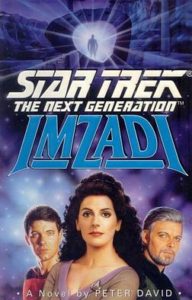 One of the best known is probably Peter David, author of almost forty novels in the Star Trek canon. Recently those have all been exclusively in the New Frontier series, a series following a ship and crew of David’s invention, though he’s penned plenty of novels starring the TV crews as well. Some of the more notable ones include Imzadi, which not only tells the story of Riker and Troi’s doomed romance on Betazed, back before TNG began, but reaches back into Trek lore and involves the Guardian of Forever, in a time travel story that, for a wonder, actually works. Canon Trek is pretty hit-and-miss when it comes to time travel, as well as referencing its own history, but David pulls off both here splendidly. The complicated structure likely wouldn’t work in a visual format (to say nothing of requiring younger actors to play the characters in the flashback sequences), but it works like gangbusters on the page.
One of the best known is probably Peter David, author of almost forty novels in the Star Trek canon. Recently those have all been exclusively in the New Frontier series, a series following a ship and crew of David’s invention, though he’s penned plenty of novels starring the TV crews as well. Some of the more notable ones include Imzadi, which not only tells the story of Riker and Troi’s doomed romance on Betazed, back before TNG began, but reaches back into Trek lore and involves the Guardian of Forever, in a time travel story that, for a wonder, actually works. Canon Trek is pretty hit-and-miss when it comes to time travel, as well as referencing its own history, but David pulls off both here splendidly. The complicated structure likely wouldn’t work in a visual format (to say nothing of requiring younger actors to play the characters in the flashback sequences), but it works like gangbusters on the page.
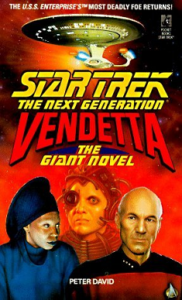 David also knits the history of the Trek mythos together in a couple other novels. In Vendetta, which works as a sequel to “The Best of Both Worlds” episodes of TNG, it’s revealed that the planet killer, from the original series episode “The Doomsday Machine,” had actually been constructed by a now-dead race to fight the Borg. The device the original Enterprise destroyed was only a prototype, and now the real deal has shown up. The problem is it’s piloted by a woman half-mad with grief over losing her family to the Borg, and who is willing to destroy anything and everything in her quest for revenge. Oh and she’s Picard’s one true love. Oh and also she’s Guinan’s adopted sister. There’s a lot going on.
David also knits the history of the Trek mythos together in a couple other novels. In Vendetta, which works as a sequel to “The Best of Both Worlds” episodes of TNG, it’s revealed that the planet killer, from the original series episode “The Doomsday Machine,” had actually been constructed by a now-dead race to fight the Borg. The device the original Enterprise destroyed was only a prototype, and now the real deal has shown up. The problem is it’s piloted by a woman half-mad with grief over losing her family to the Borg, and who is willing to destroy anything and everything in her quest for revenge. Oh and she’s Picard’s one true love. Oh and also she’s Guinan’s adopted sister. There’s a lot going on. 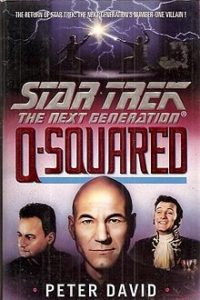
Then there’s Q Squared, which reveals Trelane, from the original series episode “The Squire of Gothos,” is in fact a Q, and when our Q is tasked with reining him in, the result is the apocalyptic collision of three different universes: the familiar TNG universe, the universe from “Yesterday’s Enterprise,” where Tasha Yar lives and the Federation is at war with the Klingons, and a universe where Jack Crusher lived and Picard is his first officer (and is having an illicit affair with Jack’s ex-wife, Dr. Beverly Howard). It’s possibly David’s most ambitious novel, but he keeps all the plates spinning and delivers an incredible story which would very likely be a complete mess, if one were to try and present it on-screen.
Diane Duane
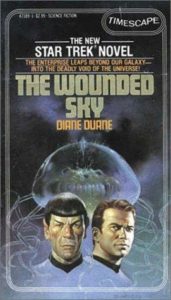 Sharp-eyed fans of TNG might recognize Duane as one of the writers on season one’s “Where No One Has Gone Before.” An at-best mediocre episode (which, for season one, was frankly quite good), the basic plot — an alien engineer comes on board, upgrades the Enterprise’s engines, and sends the ship into a realm where thought and reality are one and the same — was lifted from Duane’s first Star Trek novel, 1983’s The Wounded Sky. The Enterprise in the novel, of course, was Kirk’s, and the alien was not an embarrassing combination of ugly prosthetics and bland acting, but a crystalline spider named K’t’lk. The concepts touched upon in the episode are explored in far greater depth than a 42-minute television episode could possibly hope to, and with more emotional and psychological resonance than would probably be possible in any visual medium.
Sharp-eyed fans of TNG might recognize Duane as one of the writers on season one’s “Where No One Has Gone Before.” An at-best mediocre episode (which, for season one, was frankly quite good), the basic plot — an alien engineer comes on board, upgrades the Enterprise’s engines, and sends the ship into a realm where thought and reality are one and the same — was lifted from Duane’s first Star Trek novel, 1983’s The Wounded Sky. The Enterprise in the novel, of course, was Kirk’s, and the alien was not an embarrassing combination of ugly prosthetics and bland acting, but a crystalline spider named K’t’lk. The concepts touched upon in the episode are explored in far greater depth than a 42-minute television episode could possibly hope to, and with more emotional and psychological resonance than would probably be possible in any visual medium.
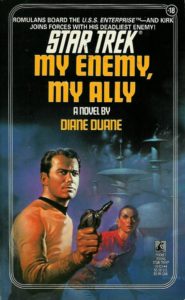 Duane would go on to write a number of Star Trek novels, based on the original series and The Next Generation both, but she’s probably best known for her Rihannsu series. The Romulans are one of the most intriguing and yet under-explored aliens in the Star Trek universe. Indeed, they figure prominently in only two episodes of the original series.
Duane would go on to write a number of Star Trek novels, based on the original series and The Next Generation both, but she’s probably best known for her Rihannsu series. The Romulans are one of the most intriguing and yet under-explored aliens in the Star Trek universe. Indeed, they figure prominently in only two episodes of the original series.
They get their due a bit more in TNG and DS9, but nowhere is their culture explored more in depth than in Rihannsu, a series of five novels concerned with the uneasy and unlikely informal alliance between Kirk and Ael, a Romulan (or Rihannsu, in their language) Captain who, while proud of her people are her heritage, often finds herself at odds with their politics. Ael is one of the most compelling characters in any Star Trek novel, Kirk’s equal in every way. And the exploration of the Romulans … bear in mind, when these books were published (the first two, at any rate), all Duane had to go on were those two episodes of TOS.
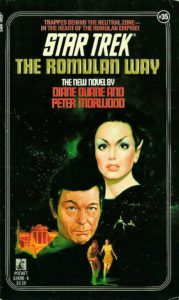 From there she essentially created an entire history and culture for the Romulans, from their origins as cast-offs from Vulcan and the founding of their Empire, to the complex political structures that exist during the time of the original series, even to their language, which Duane writes entire scenes of dialogue in while still managing to make everything make sense and remain compelling. Some of what she came up with would later be contradicted by TNG (Nemesis, especially), but that doesn’t make these novels any less brilliant or compelling for all that. The Romulan Way was a particularly bold experiment which would never have been produced as a television episode — only one character (McCoy) from the series is present, and he functions only as a secondary character. This makes the novel no less compelling as a result, however.
From there she essentially created an entire history and culture for the Romulans, from their origins as cast-offs from Vulcan and the founding of their Empire, to the complex political structures that exist during the time of the original series, even to their language, which Duane writes entire scenes of dialogue in while still managing to make everything make sense and remain compelling. Some of what she came up with would later be contradicted by TNG (Nemesis, especially), but that doesn’t make these novels any less brilliant or compelling for all that. The Romulan Way was a particularly bold experiment which would never have been produced as a television episode — only one character (McCoy) from the series is present, and he functions only as a secondary character. This makes the novel no less compelling as a result, however.
Duane hasn’t written for Star Trek in a while, but Trek’s loss is YA’s gain — her Young Wizards series is an excellent young adult series that’s every bit as compelling and emotionally powerful as her Trek novels. Still, what I wouldn’t give to see her name attached to a new Star Trek book.
Diane Carey
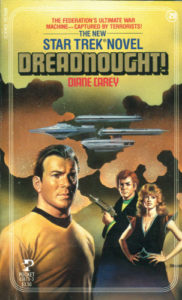 Duane’s where you go if you want a little more sci in your sci-fi. If you’re a Nicholas Meyer (director of Wrath of Khan and The Undiscovered Country) die-hard, though — if you want Star Trek to be Horatio Hornblower In Space — then Diane Carey is who you want to see about that. Rolicking militaristic sci-fi adventure is what Carey brings to Trek, and if that’s your bag then there’s none better. From the first Trek novel to be told in first-person (Dreadnought!) to a two-volume epic of young Jimmy Kirk and his father George (Final Frontier, Best Destiny), to the very first original Next Generation novel (Ghost Ship, which admittedly includes some interpretations of the main characters which now seem bizarre), to the first and last novels in the epic New Earth miniseries, Carey’s incredible action, wit, and (Ghost Ship notwithstanding) intuitive grasp of what makes these characters tick (particularly Kirk) makes her an indispensable addition to the Trek canon. Sadly, she hasn’t written an original Trek novel since 2001 (Chainmail, a novel intended to kick off a new series following the starship Challenger which, for whatever reason, never materialized), but she’s got more than enough novels to keep a new reader happy for a good long while. Get reading.
Duane’s where you go if you want a little more sci in your sci-fi. If you’re a Nicholas Meyer (director of Wrath of Khan and The Undiscovered Country) die-hard, though — if you want Star Trek to be Horatio Hornblower In Space — then Diane Carey is who you want to see about that. Rolicking militaristic sci-fi adventure is what Carey brings to Trek, and if that’s your bag then there’s none better. From the first Trek novel to be told in first-person (Dreadnought!) to a two-volume epic of young Jimmy Kirk and his father George (Final Frontier, Best Destiny), to the very first original Next Generation novel (Ghost Ship, which admittedly includes some interpretations of the main characters which now seem bizarre), to the first and last novels in the epic New Earth miniseries, Carey’s incredible action, wit, and (Ghost Ship notwithstanding) intuitive grasp of what makes these characters tick (particularly Kirk) makes her an indispensable addition to the Trek canon. Sadly, she hasn’t written an original Trek novel since 2001 (Chainmail, a novel intended to kick off a new series following the starship Challenger which, for whatever reason, never materialized), but she’s got more than enough novels to keep a new reader happy for a good long while. Get reading.
Judith & Garfield Reeves-Stevens
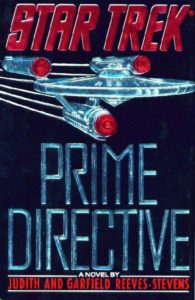 Remember how Enterprise suddenly got good in its fourth and final season? Thank new showrunner Manny Coto, and thank Judith & Garfield Reeves-Stevens, who Coto brought on to pen several episodes (including the great “The Forge” and the truly remarkable we-might-as-well-pretend-it-was-the-series-finale “Terra Prime.” This wasn’t the Reeves-Stevens’ first whack at Star Trek, though. While not as prolific as the other authors on this list, they’ve written some of the best and memorable books in the Star Trek novel series.
Remember how Enterprise suddenly got good in its fourth and final season? Thank new showrunner Manny Coto, and thank Judith & Garfield Reeves-Stevens, who Coto brought on to pen several episodes (including the great “The Forge” and the truly remarkable we-might-as-well-pretend-it-was-the-series-finale “Terra Prime.” This wasn’t the Reeves-Stevens’ first whack at Star Trek, though. While not as prolific as the other authors on this list, they’ve written some of the best and memorable books in the Star Trek novel series.
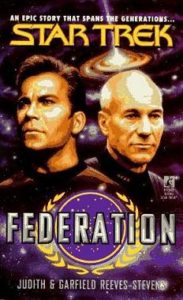 The best way to describe the Reeves-Stevens’ various works seems to be “the book that should have been …” Prime Directive, an incredible story and a marvelous summation of what made TOS great, should have been the TOS series finale. Federation, a breathtakingly epic and emotionally powerful story spanning three generations and both Enterprise crews, should have been the film Star Trek Generations. And their incredible, ambitious, apocalyptic Millenium trilogy (The Fall of Terok Nor, The War of the Prophets, and Inferno) should have been DS9’s series finale. The Reeves-Stevens go hard when it comes to science and theoretical physics, but they also have the voices of the characters down more so even than anyone else on this list. I cannot recommend their works highly enough.
The best way to describe the Reeves-Stevens’ various works seems to be “the book that should have been …” Prime Directive, an incredible story and a marvelous summation of what made TOS great, should have been the TOS series finale. Federation, a breathtakingly epic and emotionally powerful story spanning three generations and both Enterprise crews, should have been the film Star Trek Generations. And their incredible, ambitious, apocalyptic Millenium trilogy (The Fall of Terok Nor, The War of the Prophets, and Inferno) should have been DS9’s series finale. The Reeves-Stevens go hard when it comes to science and theoretical physics, but they also have the voices of the characters down more so even than anyone else on this list. I cannot recommend their works highly enough.
(They also co-wrote the “Shatnerverse” Trek novels with William Shatner, but don’t hold that against them. Actually, the graphic novel adaptation of The Ashes of Eden isn’t bad.)
David Mack
David Mack, oddly, is the only author on this list who’s currently writing Star Trek novels. You shouldn’t take that to mean he’s the only author currently writing good Star Trek novels — in particular, I’ll buy anything from Christopher L. Bennett, James Swallow, or John Jackson Miller, just to name a few — but he’s the best of the bunch, in my opinion.
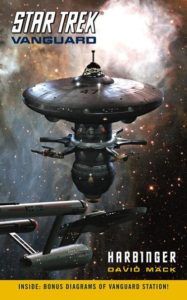 Mack’s first Star Trek work was, unlike the rest of the authors on this list, for the show itself. DS9’s excellent season four episode “Starship Down” was co-written by Mack, and he also received a “story by” credit on season seven’s remarkable “It’s Only A Paper Moon.” On the lit side, he started writing for Wildstorm’s DS9 comic series, moved on to the e-book short story series Corps of Engineers, and finally broke onto the novel scene with A Time To Kill and A Time To Heal, the penultimate chapters of the novel miniseries leading up to the events of Star Trek Nemesis. He hit his stride, however, with Vanguard, a miniseries set in the early days of the Original Series, set on a space station in an unexplored sector claimed not only by the Klingons and the Tholians, but an ancient alien power, as well. In writing every other novel in the Vanguard series (the others were written by Dayton Ward & Kevin Dilmore), Mack contributed to the creation of an incredibly compelling cast of characters, an alien threat that fires the imagination, and used both the aesthetics and the “rough ‘n ready” feel of the original series to great effect. Some of the characters and starships from Vanguard were even carried over into a new series, Seekers.
Mack’s first Star Trek work was, unlike the rest of the authors on this list, for the show itself. DS9’s excellent season four episode “Starship Down” was co-written by Mack, and he also received a “story by” credit on season seven’s remarkable “It’s Only A Paper Moon.” On the lit side, he started writing for Wildstorm’s DS9 comic series, moved on to the e-book short story series Corps of Engineers, and finally broke onto the novel scene with A Time To Kill and A Time To Heal, the penultimate chapters of the novel miniseries leading up to the events of Star Trek Nemesis. He hit his stride, however, with Vanguard, a miniseries set in the early days of the Original Series, set on a space station in an unexplored sector claimed not only by the Klingons and the Tholians, but an ancient alien power, as well. In writing every other novel in the Vanguard series (the others were written by Dayton Ward & Kevin Dilmore), Mack contributed to the creation of an incredibly compelling cast of characters, an alien threat that fires the imagination, and used both the aesthetics and the “rough ‘n ready” feel of the original series to great effect. Some of the characters and starships from Vanguard were even carried over into a new series, Seekers.
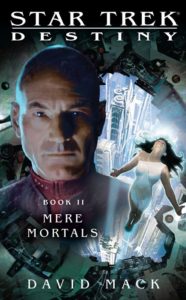 Where he really blew my mind was the Destiny trilogy. A crossover novel that manages to elegantly and organically include not only the Enterprise-E, the Titan (Riker’s ship and the subject of a current novel series), and the newly-introduced Aventine (Captain Ezri Dax, commanding), but also the NX-02 Columbia, contemporary of Captain Archer’s NX-01 Enterprise, Captain Erika Hernandez, commanding. The story is nothing less than the rise and fall of the Borg, a — to my mind — much-overused adversary which Mack makes terrifying once again, both in their final assault on the Federation, and their disturbing origins. If you want to see just how compelling and electric Star Trek can be on the page, look no farther than the Destiny trilogy.
Where he really blew my mind was the Destiny trilogy. A crossover novel that manages to elegantly and organically include not only the Enterprise-E, the Titan (Riker’s ship and the subject of a current novel series), and the newly-introduced Aventine (Captain Ezri Dax, commanding), but also the NX-02 Columbia, contemporary of Captain Archer’s NX-01 Enterprise, Captain Erika Hernandez, commanding. The story is nothing less than the rise and fall of the Borg, a — to my mind — much-overused adversary which Mack makes terrifying once again, both in their final assault on the Federation, and their disturbing origins. If you want to see just how compelling and electric Star Trek can be on the page, look no farther than the Destiny trilogy.
Obviously I’ve left out a ton of deserving authors. Sound off about some of your favorites in the comments!

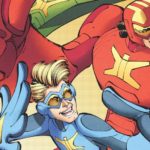

![[PODCAST] THE COMICS AGENDA: SUPERHEROES? MORE LIKE SUPER BORING!](https://geekd-out.com/wp-content/uploads/2017/11/comics-agenda-2-150x150.jpg)